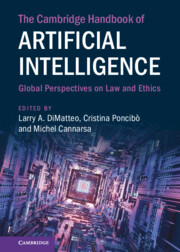Book contents
- The Cambridge Handbook of Artificial Intelligence
- The Cambridge Handbook of Artificial Intelligence
- Copyright page
- Contents
- Figures
- Contributors
- Foreword
- Preface
- Part I AI: Development and Trends
- Part II AI: Contracting and Corporate Law
- 4 AI in Negotiating and Entering into Contracts
- 5 AI and Contract Performance
- 6 AI and Corporate Law
- Part III AI and Liability
- Part IV AI and Physical Manifestations
- Part V AI and Intellectual Property Law
- Part VI Ethical Framework for AI
- Part VII Future of AI
5 - AI and Contract Performance
from Part II - AI: Contracting and Corporate Law
Published online by Cambridge University Press: 28 July 2022
- The Cambridge Handbook of Artificial Intelligence
- The Cambridge Handbook of Artificial Intelligence
- Copyright page
- Contents
- Figures
- Contributors
- Foreword
- Preface
- Part I AI: Development and Trends
- Part II AI: Contracting and Corporate Law
- 4 AI in Negotiating and Entering into Contracts
- 5 AI and Contract Performance
- 6 AI and Corporate Law
- Part III AI and Liability
- Part IV AI and Physical Manifestations
- Part V AI and Intellectual Property Law
- Part VI Ethical Framework for AI
- Part VII Future of AI
Summary
The autonomy inherent in AI systems brings legal challenges. The reason is that it is no longer possible to predict whether and how explanations and actions emanating from AI systems originate and whether they are attributable to the AI system or its operator. The core research is whether the operator of AI systems is contractually liable for the damage caused by its malfunctioning. Is contract law sufficiently prepared for the use of AI systems for contract performance? The answer is provided through a review of the common law, CISG and the German Civil Code (BGB).
Keywords
- Type
- Chapter
- Information
- The Cambridge Handbook of Artificial IntelligenceGlobal Perspectives on Law and Ethics, pp. 59 - 73Publisher: Cambridge University PressPrint publication year: 2022

